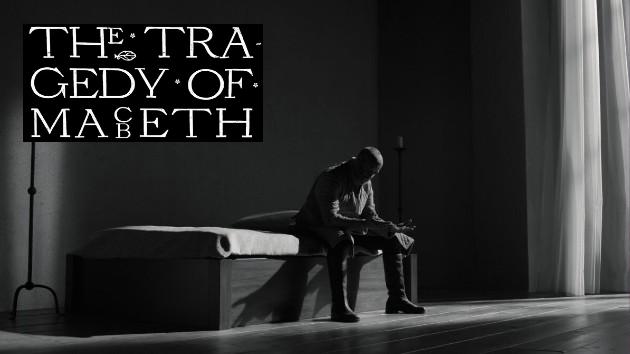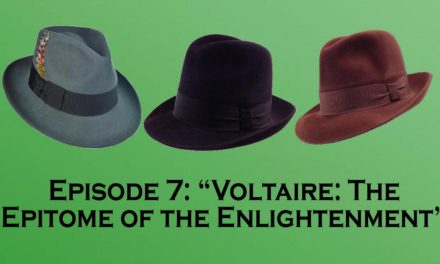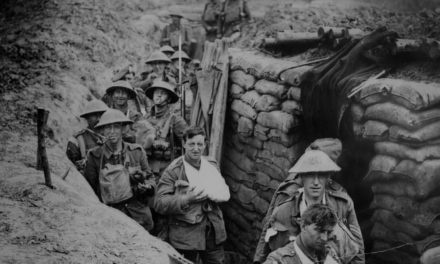Hello Otterites! Francis here again.
It should come as no surprise to anyone who has listened to us for very long that we are huge lovers of Shakespeare. We have devoured his plays since college and do our very best to attend the performances of our local KY Shakespeare Festival every year.
(It’s the longest running free Shakespeare in the nation, having just finished their 60th season. Please check out their website and if you are able, show them some financial love. ‘Free Will’ as they say is only available through generous donors like Martin, Robert, Francis and you.)
But this post is not meant to be a commercial, it’s about one of the Bard’s most performed plays, The Tragedy of Macbeth.
Urban legend in the theater community tells that speaking the name of this play aloud when it’s in production is bad luck, so it’s often referred to as ‘The Scottish Play’. Martin thinks this is a beautiful practice, because as he will tell you, “If it’s not Scottish, it’s CRAP!”
This Christmas Joel Coen’s The Tragedy of Macbeth starring Denzel Washington and Frances McDormand will see a limited theatrical release. Yours truly will be there on opening day. I’ll show you one of its trailers (there are four total) and while they are all hella brief like this one, the setting, atmosphere and powerful performances may make this the very best version done to date:
The horrific splendor of this play has been enjoyed for centuries, and it was the very first of the Bard’s works I saw performed live, on my first trip to Central Park in 1990. It is also one of the most filmed of Shakespeare’s plays, having no less than twenty film versions (of varying degrees of faithfulness to the original text) since 1908.
Although I’ve not seen them all, here are those I consider most notable . . .
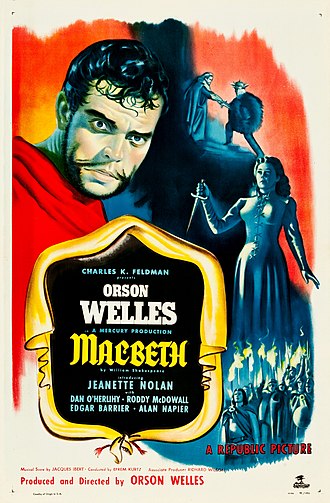
Any real discussion of Macbeth on film has to start with Orson Welles. In 1948 he made a beautiful adaptation of the play, the first major motion picture version, and with him in the title role and his genius behind the camera, you would think this one would be the perfect version . . . and in so many ways it is.
Except the damn thing is too short.
The original theatrical release was only 89 minutes, and while an extended version of 107 minutes was released in 1980 and made a distinct improvement, the entire production suffered as a result of the breakneck pacing Republic Pictures forced Welles to employ to keep the film under an hour and a half. Too many of the Bard’s words fell to the floor unspoken.
The black and white format produces a perfect eerie atmosphere to complement the text, and while Welles is outstanding in the title role, the other players, particularly Jeanette Nolan as Lady Macbeth, are just not as good.

Yes, I know, this is just a loose adaptation and does not contain any of Shakespeare’s words. But oh-chi-wow-wah is it great. (That’s a made-up term by me, by the way, not anything in Japanese.)
Set in feudal Japan and directed by the celebrated Akira Kurasowa, this movie contains perhaps the most powerful performance of the main character ever committed to film thanks to the legendary Tishiro Mifune. None of the other actors are well known outside of Japan, and the role of Lady MacBeth is minimized here considerably, nonetheless, it is still a masterpiece of cinema and storytelling, right down to the amazing arrow barrage that takes place at the very end.
This is the lone stinker on the list, but it shouldn’t be.
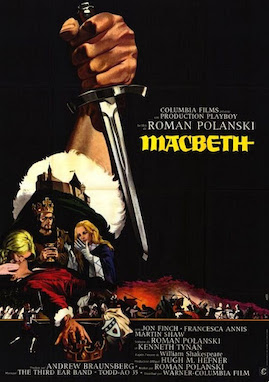
The first major theatrical adaptation after Welles’ version, Roman Polanski’s 1971 film had so much potential. Faithful to the text, in color, shot in amazingly bleak and yet beautiful locations, and with two veteran Shakespearean actors, Jon Finch and Francesca Annis in the main roles, this one should have become the standard.
But Polanski brought himself to the production.
Macbeth was Polanski’s first picture after the Manson Murders which so changed his life, and it shows in this film. (He couldn’t get financing from any traditional sources, so he had to turn to Hugh Hefner and Playboy to put up the money for it.)
The costuming and performances are excellent, and the fight scene between Macbeth and MacDuff at the end is an amazing moment, but most of Polanski’s creative choices – lighting, scene structure, staging and a dozen others – all come off as creepy in the extreme. (There is even a full-frontal nude scene with a male child for no valid reason I can think of.)
Jon Finch’s powerful and haunted performance was not enough to save the film. It bombed badly at the box office and was seen as a critical failure.
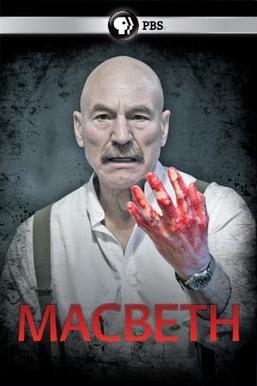
Technically a television adaptation, and one which reinvents the setting into a dystopian, vaguely World War I nightmare, this version deserves its place as one of the best performances ever given in the title role for one inarguable reason: Sir Patrick Stewart.
It is not truncated like Welles’ version, nor sanitized like so many stage productions as blood abounds everywhere. Kate Fleetwood is an amazing Lady Macbeth and if you asked me for my favorite version, this one would take the prize.
What keeps it from being perfect? Well, it’s not particularly Scottish. The inventiveness of the setting is brilliant (it was filmed entirely indoors at Welbeck Abbey in Nottinghamshire) and this unique choice is executed beautifully, but this keeps the scope of the film tight and internal. Not that this is a bad artistic choice, as the text certainly lends itself to this approach, but I miss the overt Scottish-ness that is so embedded into Shakespeare’s text. (I know Martin agrees with me for the reason mentioned above.)
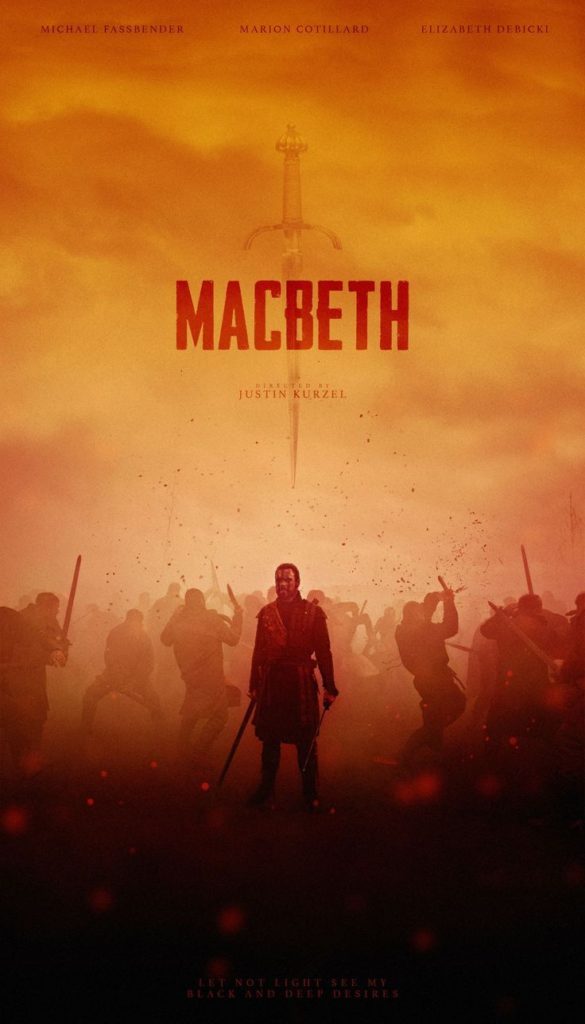
Finally, a full outdoor Scottish setting, with the glory of Shakespeare’s words and some powerful actors to pull it off.
Michael Fassbender has some serious acting chops, and he showcases them brilliantly in this film. Marion Cotillard plays Lady Macbeth with all the chilling practicality and eerie manipulations of her husband that make this film adaptation the closest yet to perfection.
The cinematography is fantastic, the performances are nuanced and deep . . . but the horror, madness and corrupting nature of sin and evil seem sent to the back of the bus in favor of remaking the action of Braveheart.
Yes, I know I sound like a whiny ass. First there’s not enough Scotland, and now there’s too much. None of this is rational folks. If you want the best version made to date, yes, it has to be this one.
Which leaves me with one final mention . . . the one that got away.
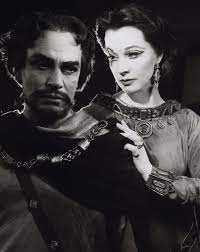
To say Sir Laurence Olivier was the greatest Shakespearean actor that ever lived would not be excessive hyperbole. His masterpiece Richard III is perhaps the greatest film version of any of the Bard’s plays that ever has been or ever will be done. But did you know that Olivier tried to make a film version of Macbeth just after that?
It’s one of the great missed opportunities of Shakespearean cinema that Sir Larry was unable to get the financing to make his Macbeth in the late Fifties. Olivier had played the mad Scottish king on stage to rave reviews at Stratford in 1955, along with his then-wife Vivian Leigh, who was scheduled to play Lady Macbeth opposite her husband in the film version.
One bright spot in this (although it could be considered salt-in-the-wound) is that thirteen versions of Olivier’s screenplay were uncovered in 1980 and are now available to read at the British Library. (Sadly they do not appear to be available online.)
Oh, what could have been . . .
I know I have omitted so many great performances here that deserve viewing. Ian McKellen and Judi Dench in 1979, Nicol Williamson and Jane Lapotaire in 1983 and Sean Pertwee and Greta Scacchi in 1998 come to mind and all are currently available and well worth your time.
Macbeth is a bleak and moody play, so in these dark winter months which are almost upon us again, find some time to grab your favorite adult beverage, remove all distractions, and descend into the world of ambition, madness and murder with one of these amazing performances.

